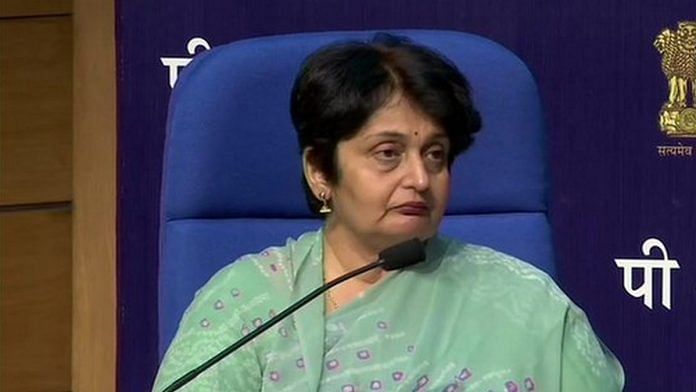New Delhi: Union Health Secretary Preeti Sudan has written to states and union territories, asking them to create an enabling environment where mental health issues such as depression and anxiety can be openly discussed.
Sudan’s letter, addressed to chief secretaries, comes days after the Ministry of Health and Family Welfare released detailed guidelines on mental health during the Covid-19 pandemic, and after actor Sushant Singh Rajput’s apparent death by suicide triggered an outcry about the secrecy shrouding these issues.
In her letter, dated 6 July, Sudan wrote: “While we appreciate all the efforts being taken thus far by the states and UTs to combat Covid, it is also critical at this point that we open discussions around mental health issues.”
The letter said there is a need to bring these issues to the fore and make them accepted as common ailments, which could be faced by anybody at any phase of life, but are amenable to treatment.
“The common signs and symptoms of the depression and anxiety need to be discussed openly so that anybody who starts facing the problem is able to identify, accept and seek help. Lack of knowledge and ignorance is what aggravates the problem,” Sudan wrote.
“Mental health services including advocacy and awareness campaigns should essentially become part of the government’s response to COVID-19,” she added, also asking states to initiate screening and use all means available to spread awareness about mental health issues.
Also read: A huge mental health crisis awaits India post-Covid, but only the power of community will help
India’s mental health burden
According to the first comprehensive estimates of India’s mental health burden, released last year by the Public Health Foundation of India, about 197 million persons, or roughly one in seven Indians, suffered from mental disorders of varying severity in 2017.
These included depression, anxiety disorders, schizophrenia, bipolar disorders, idiopathic developmental intellectual disability, conduct disorders, and autism.
Depression and anxiety disorders are the commonest mental disorders in India with 45-46 million people suffering from each. Their prevalence is increasing across India and is relatively higher in the southern states and in females.
This existing burden can see both aggravations and additions in the current unique situation of the pandemic, the ministry’s guidance document released on 4 July has predicted. The document lists fear of contracting the disease, economic downturn, job losses, the stigma of Covid-19 and lack of support systems because of social distancing as some of the problems that can aggravate mental health issues during the lockdown.
“Persons with pre-existing mental illnesses and substance use are particularly disadvantaged during the lockdowns. For persons with mental illness or epilepsy, reduced access to medication can lead to relapse of symptoms, as can the compounded stress,” it states.
“For persons with substance use disorders, sudden withdrawal leading to seizures, delirium, agitation, and even suicide have been described,” the document said, going on to highlight the unique needs of children and the elderly during a pandemic.
Also read: Discussing mental health during Covid isn’t just for woke Instagrammers, it’s for everyone
Higher burden in urban areas
In her letter, Sudan listed out the steps taken by the ministry during the pandemic to deal with mental health concerns. This includes the 24×7 helpline (080-4611 0007), in collaboration with National Institute of Mental Health and Neuro-Sciences (NIMHANS), to provide psychosocial support by mental health professionals for different target groups, such as children, adult, women and elderly, a separate helpline for healthcare workers, advocacy on mental health issues and the guidance document.
She also made the point that mental health issues are often more widespread in urban areas.
“Psychosocial concerns cut across age groups and segments of the population, though in varying degrees. Incidence and prevalence of mental health issues, however, tend to be higher in the urban areas, and even more skewed towards the metropolitan cities,” Sudan wrote.
“While there may be many causative factors to this reality, declining social support in the nuclear families and restricted social networking due to Covid-19 are among important reasons,” she continued.
“The identification and acceptance of mental health issues is relatively low due to the stigma attached with it. Given the above factors, it is imperative to focus on preventive aspects of mental healthcare and early detection.”
Also read: Everyone is a mental health expert now, but still post their ‘perfect lives’ on social media



